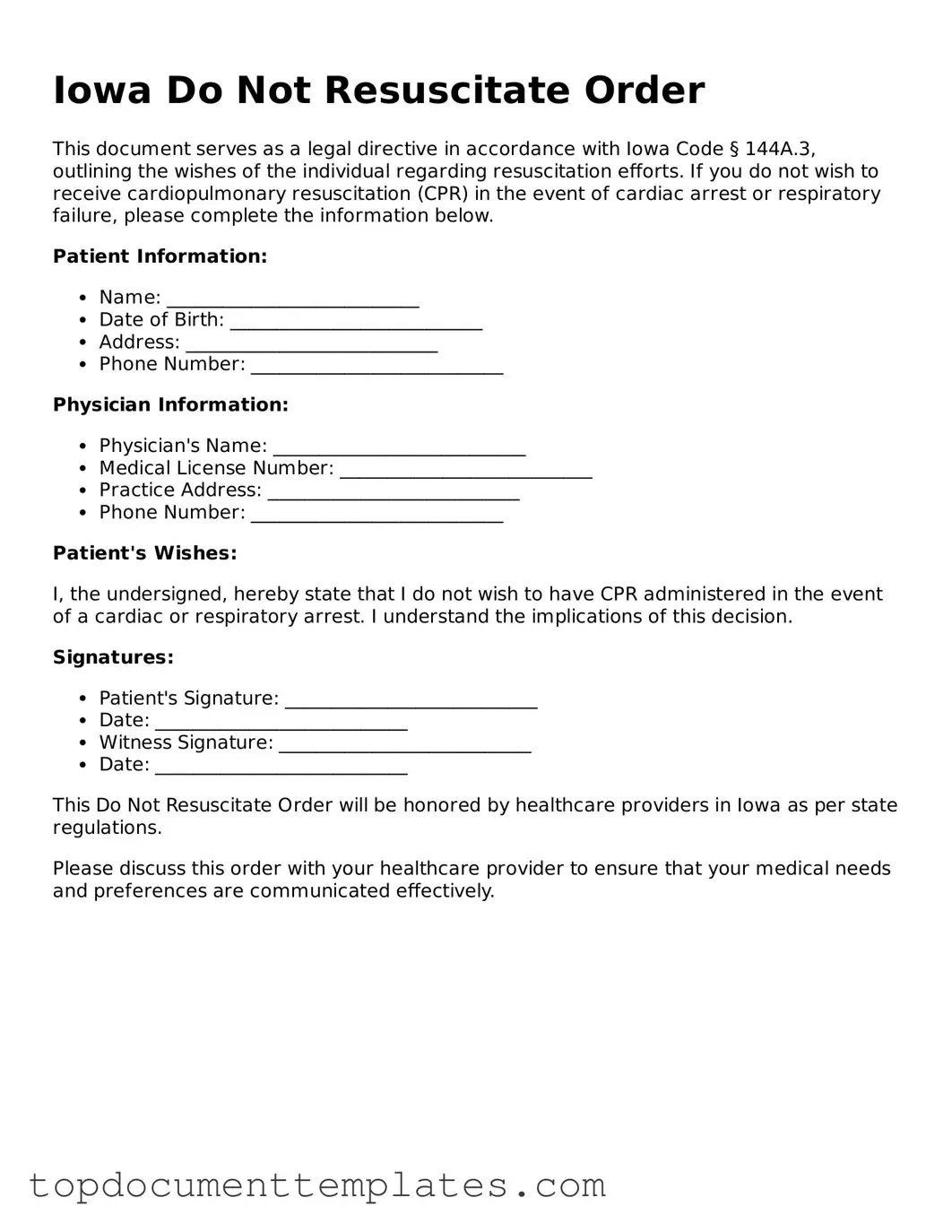Valid Do Not Resuscitate Order Form for Iowa State
The Iowa Do Not Resuscitate (DNR) Order form is a critical document designed to respect the wishes of individuals regarding their medical care in emergencies. This form serves as a clear directive for healthcare providers, indicating that a patient does not wish to receive cardiopulmonary resuscitation (CPR) or other life-saving measures in the event of cardiac or respiratory arrest. It is essential for patients, particularly those with terminal illnesses or advanced age, to understand the implications of this choice. The DNR form must be completed with the guidance of a physician, ensuring that the decision is informed and reflective of the patient's values and preferences. Importantly, this document must be signed by both the patient and their healthcare provider, thereby establishing a legal basis for the patient's wishes. Additionally, it is advisable for individuals to discuss their DNR status with family members and caregivers, fostering understanding and support for their decisions. In Iowa, the DNR form is recognized across various healthcare settings, making it a vital tool for ensuring that a patient's end-of-life care aligns with their desires.
Similar forms
- Advance Healthcare Directive: This document outlines an individual's preferences for medical treatment in situations where they may not be able to communicate their wishes. Like a DNR, it provides guidance to healthcare providers regarding the patient's desires.
- Living Will: A living will is a type of advance directive that specifically addresses end-of-life care. It details the types of medical treatment a person wishes to receive or avoid, similar to how a DNR specifies resuscitation preferences.
- Durable Power of Attorney for Healthcare: This document allows an individual to appoint someone else to make healthcare decisions on their behalf. It can include instructions related to resuscitation and other medical interventions, much like a DNR order.
- POLST (Physician Orders for Life-Sustaining Treatment): A POLST form translates a patient's wishes regarding life-sustaining treatments into actionable medical orders. Similar to a DNR, it is intended for individuals with serious illnesses and provides clear instructions to medical personnel.
- Do Not Intubate Order: This order specifically instructs healthcare providers not to insert a breathing tube in the event of respiratory failure. It shares similarities with a DNR in that it addresses specific life-sustaining measures to be avoided.
- Florida Power of Attorney: This document grants authority to an agent to act on behalf of a principal in financial or health-related matters, ensuring that an individual’s wishes are respected, as outlined on OnlineLawDocs.com.
- Comfort Care Order: This document focuses on providing comfort and alleviating pain rather than prolonging life. It aligns with the principles of a DNR by prioritizing quality of life over aggressive medical interventions.
- End-of-Life Care Plan: This comprehensive plan outlines a person's wishes for their care as they approach the end of life. It can include preferences related to resuscitation, making it similar to a DNR in its focus on patient autonomy and comfort.
Guidelines on Writing Iowa Do Not Resuscitate Order
Filling out the Iowa Do Not Resuscitate Order form is an important step in ensuring your healthcare wishes are respected. After completing the form, it should be signed by a physician and kept in a place where it can be easily accessed by medical personnel. Here’s how to fill it out correctly.
- Obtain the Iowa Do Not Resuscitate Order form. This can be found online or through healthcare providers.
- Begin by entering your full name in the designated section at the top of the form.
- Provide your date of birth. This helps to identify you accurately.
- Fill in your address, including city, state, and zip code.
- Next, indicate whether you have a designated healthcare representative. If so, include their name and contact information.
- In the section regarding your medical condition, provide any relevant details that may assist your physician in understanding your health status.
- Sign and date the form at the bottom. Your signature confirms your wishes.
- Have your physician sign the form. Their signature is essential for the document to be valid.
- Make copies of the completed form. Keep one for your records and provide copies to your healthcare representative and any relevant medical facilities.
File Information
| Fact Name | Description |
|---|---|
| Purpose | The Iowa Do Not Resuscitate Order (DNR) form allows individuals to refuse resuscitation in the event of cardiac or respiratory arrest. |
| Eligibility | Any adult can complete the DNR form, provided they are of sound mind and understand the implications of their decision. |
| Governing Law | The Iowa DNR Order is governed by Iowa Code §144A.3, which outlines the legal framework for advance directives. |
| Signature Requirement | The form must be signed by the individual or their authorized representative, ensuring that the decision is documented and respected. |
| Healthcare Provider Notification | Once completed, the DNR form should be shared with healthcare providers to ensure that the individual's wishes are honored in emergencies. |
Other Popular Do Not Resuscitate Order State Forms
Dnr Form - A DNR is a legally recognized document in many jurisdictions.
A New York Bill of Sale form is a legal document that serves to transfer ownership of personal property from one individual to another. This form provides essential details about the transaction, ensuring clarity and protection for both parties involved. Understanding how to properly use this form can simplify the buying and selling process in New York, and more information can be found at documentonline.org/blank-new-york-bill-of-sale.
What Is Dnr Mean - It helps patients ensure their treatment preferences are honored in critical situations.
